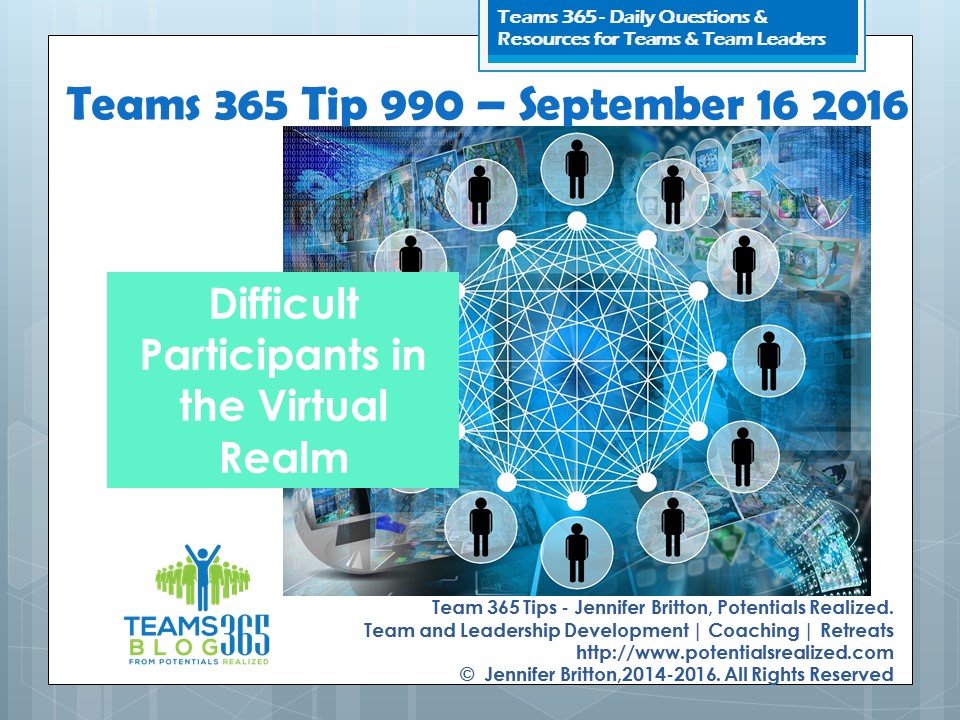Copyright 2016 - Jennifer Britton
Within every group there is a tremendous variety of personalities which exist. As facilitators we may find that some of them are easier to support than others. Today’s post highlights five different types of personalities which can be part of a virtual call. These may become difficult issues for facilitators to manage. Let's look at each style and some potential ways to mitigate, and support, while maintaining respect, and a positive learning environment for everyone involved.
1. Challenger - The challenger challenges everything, and it may include why your meeting, who is at the table, and outcomes. In the virtual realm the challenger can quickly turn everyone off. Being clear prior to the start of the meeting with process - how outcomes and agenda items - is one of the ways to mitigate against this. In the virtual realm clarity of communication and process is key.
The challenger's vantage point is usually one of great value. Typically there is always value, and something to be learned, from the perspective of the Devil's Advocate. What is the request behind the challenger's complaint?
2. Avoider - The avoider may be a more passive group member who id disengaged and does not take responsibility for outcomes, participation or next steps. While we can only influence, as a facilitator our role is to make sure there is agreement around what next steps are, who is responsible and what is expected. It may be important to talk about "what happens if these are not followed through?". Let the group and/or systems in place also address the impact of the avoider.
Creating opportunities for work and dialogue in smaller groups, such as virtual breakouts, often encourages and necessitates that the avoider becomes a more actively engaged participant around the virtual table. What is behind this avoidance? Lack of knowledge? Skill? Understanding? Lack of confidence? If you are working with this person fora longer time, helping the person become aware of the impact they are having in the virtual space can be an important series of conversations to have.
3. Dominator
The dominator wants to take charge and probably wants to be leading the meeting. They usually hog air time and dominate the call virtually through speaking, sounds (grunts), or even over-annotating with tools they have.
Consider providing this person a structured role so they can positively channel their focus. perhaps they become a time keeper, or minute taker for the process.
4. The multitasker - The multitasker is a very common, and difficult participant, who can be present in most virtual calls. Their multi-tasking may be very visible through typing, background noise etc. Creating shared expectations as a group with respect to what fous and engagement is expected can provide encouragement. When you do have rapport with group members letting them know that you can see their multi-tasking online may prompt them.
What will help this person focus? What do they need in order to stop multi-tasking? What are they aware of in terms of their impact?
While there are many more difficult issues, these are four common ones that show up in different virtual calls. As the facilitator you play a key role in ensuring that it is a safe and positive learning environment for everyone, grounded in respect.
What strategies do you want to employ? How are you also someone else's difficult participant?
Have a great weekend,
Jennifer
Potentials Realized | Coaching Team Leaders
Check out our newest on-demand course: Teams365 Teamwork Foundations
Follow us on Twitter @Teams365
Join us this fall for a 15 hour Virtual Train-the-trainer in the Virtual Facilitation Skills Intensive program. We'll be covering the best practices of designing and leading virtual calls. The program will be held on Fridays from 3 - 4:30 pm ET starting September 23. Click here to learn more and reserve your spot

 RSS Feed
RSS Feed





